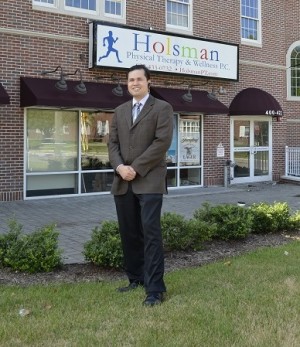Expat’s chain of physical rehab clinics getting bigger

Leyte-native Dr. Richard Holsman founded the Holsman Healthcare and Rehabilitation Center three years after arriving in the U.S. PHOTO BY ELTON LUGAY
CLIFTON, New Jersey—Physical therapy was not the vocation of choice of Leyte-born Dr. Richard Holsman. He wanted to become a medical doctor. But he also wanted to be on the safe side.
“I didn’t want to take up nursing or biology, I wanted a fallback in case I don’t make it,” said Richard, whose mother is Filipino and whose German father is Jewish.
A doctor in physical therapy, he founded the Holsman Healthcare and Rehabilitation Center in 2004. At 39 years old, he is now a CEO of his company and has over a dozen rehabilitation centers in New York and New Jersey.
He never thought of going abroad when he switched courses, from pre-med to physical therapy.
“But when I was in school, everyone in the faculty, the instructors, in the middle of the semester, they leave because they get hired in the States. So everyone already had an inkling of coming to the United States,” he said in an interview with The FilAm at his office in Clifton, New Jersey.
Article continues after this advertisementImmediately after graduation in 1997, his school, the University of Perpetual Help, hired Holsman as a clinical instructor. He was asked to teach in the college in Las Pinas. After barely a month, Makati Medical Center offered him a position. He worked for three months. But his alma mater called him again. This time, the school offered him the chair of the Physical Therapy department. All these while he was volunteering at St. Luke’s Medical Center.
Article continues after this advertisementWorking visa
A year later, he came to New York to take the state board exams. He passed and was told by a prospective employer that he had to wait in the Philippines to get his H-1 visa. His working visa was issued in 1998, but he had to wait for two years to come to the U.S.
But this did not deter his ambition. He opened a rehab clinic in the Philippines and provided free services. “I didn’t mind because I had a position. I was teaching during that time plus I had a free clinic.”
Three years after arriving in the U.S. in 2001, he opened Holsman Healthcare. “I got interested to open my own rehab center through the constant prodding of a friend. And when I was working, the clinics kept asking for more hours to work. Obviously, there’s more need to satisfy the demand.”
The clinic started with a few therapists, who wanted to do part time but were offered full-time positions with benefits. According to Holsman, “That’s how we grew.”
The biggest challenge at first was the cash flow.
He explained: “The facilities pay you really long. You pay the therapist in a week, but you get your money maybe in two, three months so I had to put up more capital. First, it was all my funds, whatever I saved. Then, I took a loan. I remember it was $16K. It was small. But then we started small.”
His fulfillment comes from seeing the recovery in his patients.
No miracle
“I feel happy when I see my patients who are at first, unable to walk and then they start walking. There were patients of mine where other facilities just gave up on them. For two years they couldn’t walk and then we did programs that are research-based and they started walking. Obviously this not for everyone, and I can’t say it’s all miracle, it’s all research-based.”
Even some Alzheimer’s patients have a good chance at walking again, he said.
“It’s just up to a certain point that you could do that, once their contractures set in you can’t do anything. If the joints are already contracted, already tight, then they don’t move anymore there’s no way you can.”
As a business owner, Holsman said he has been able to help a lot of therapists get their papers whether they’re from the Philippines, India or the U.S.
“As with any businesses, there are challenges but that fulfillment of being to help our patients and staff is what really drives us to do more.”
Holsman never got to meet his father, and this fueled his drive and independence. “He was 62 years old when I was born,” said the graduate of Boston University in Massachusetts. “I never had a father figure growing up, so I became independent at an early age.”
He has three siblings. A sister is in London and two older brothers are in the Philippines.
Growing family
Just like his enterprise, his family is young and growing. He and his wife Mary, a nurse practitioner, have twin boys Philip and Tim who are 18 months old and one daughter, Fiona, who’s 14.
In two years’ time, he hopes to have at least 30 more clinics through acquisitions or by “building from scratch, although he’s the first to say that growth is not measured in terms of how many facilities one has.
“If we’re able to get our patients get well, that’s success to us,” he said.